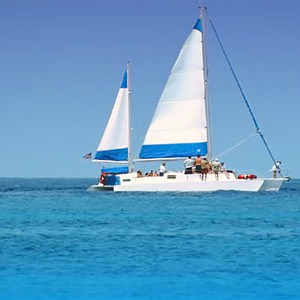Please Register / Login to take part in discussions about the Virgin Islands.
This is a carry over from ms411's topic on the relocation message board but thought it would be good to share with all of our vacationers.
This is information directly obtained from Fish & Wildlife:
"It is against VI Code to collect shells, coral, live rock, bird eggs or nests, etc. And conch shells too. Customs has been confiscating these items."
There's a campaign by VINE for "leave paradise in its place" which is about not removing shells or other natural products.
Who knows how effective anything is on our islands, where there is a general lack of concern for such things, and lack of interest in spreading the word."
VINE" informational ad with website addresses. Virgin Island Network of Enviromental Educators.
[www.virginislandsthisweek.com
"We have harvest regulations for conch: minimum size of 9 inch shell, must be landed alive and in shell, no disposal of shell at sea or offshore islands, transport of meat over open water prohibited, closed season June to November, possession of conch during closed season prohibited. So you'll find large piles of shells on beaches where fishermen land the conch."
"The reason shells need to stay on the beach is because they provide habitat for other creatures, like hermit crabs, but other creatures will inhabit them as well. Plus the shells break down and make sand, and all that.
Conch are CITES listed, though, (Convention on the Trade in Endangered Species) so it'll illegal to take them or any part of them from one country to another without a CITES permit. "
Take a picture not the shell, coral, sea fan, plant or animal.
Thanks ms411 for starting the thread.
I've made greeting cards from my seashell photos. Here's my starfish birthday card (sorry for poor image quality).
http://pinterest.com/pin/392587292486739112/
My thank you card has a photo of a queen conch shell, and my congratulations card has a sea fan photo with caption, "Congratulations from Your Biggest Fan!"
Here's an interesting article on the damage sunscreen, of all things, does to our reefs!
Who knew?
Sunscreens are among the products we are encouraged to use liberally to protect ourselves from
the sun’s harmful rays. However, researchers are finding that while protecting humans, some
compounds in many sunscreens can harm the coral on our reefs. Researchers testing the effects
of sunscreen on corals explain that chemicals in sunscreen can awaken coral viruses. The coral
then becomes sick and expel their life-giving algae. Without these algae, the coral “bleaches”
(turns white), and often dies.
We may not realize that the products covering our skin wash off when we enter the water, and
it adds up! Research tells us that 4,000 to 6,000 TONS of sunscreen enters reef areas annually.
This does not spread out rapidly or evenly over the entire ocean, but concentrates on popular
tourist sites. It is estimated that 90% of snorkeling/diving tourists are concentrated on 10% of the
world’s reefs. This means that our most popular reefs, such as those in our national parks, are
exposed to the majority of sunscreens.
Sunscreens: The double edged sword
As a visitor to the park and the reefs, you can reduce the risk of harming coral by taking a more
“reef friendly” approach to sun protection.
CHECK THE LABELS: While no sunscreen has been proven to be completely ‘reef-friendly,’
those with titanium oxide or zinc oxide, which are natural mineral ingredients, have not been
found harmful to corals. Sunscreens sold for children or for those with sensitive skin may contain
these gentler compounds as the active ingredients.
COVER UP: You can protect yourself as well as the reef by ‘covering-up’ before you enter the
water. On the water, wear hats, sunglasses and light, long-sleeved clothing to protect you.
In the water, a long-sleeved shirt or rash guard will help prevent sunburn.
Remember, if it’s on your skin, it’s on the reef. Be reef friendly!
Reduce the amount of sunscreen you leave behind…
Alana33, I think you should start a new thread on sunscreen. People who've already read our previous messages may not come back to read more. JMHO.
Good idea, Thanks.
Those shells had to come from somewhere and had live creatures in them before being polished up for sale.
At this point in time, even if you love seashells, stop purchasing and collecting them. I love them too, but sometimes it is better to take a stand and do the right thing. If the demand dwindles, maybe there shall be more shells in the sea and on the beaches making sand and homes for other live creatures that really do require them.
Hmmm, Sanibel Island in FL (and there's another place, too) may be an exception. I googled Sanibel Island, and found an article that said the island's location is what makes them awash in shells. Those empty shells in the Gulf are transported to the island due to movement of the wind/water. I don't know, though, if there are any creatures on/near Sanibel that would use the empty shells (article didn't say anything about that), and I would think that even if you put those shells back in the water, they'd come right back to Sanibel.
Maybe we should post this for Aa2A? on the Relocation Board? I think I will!


